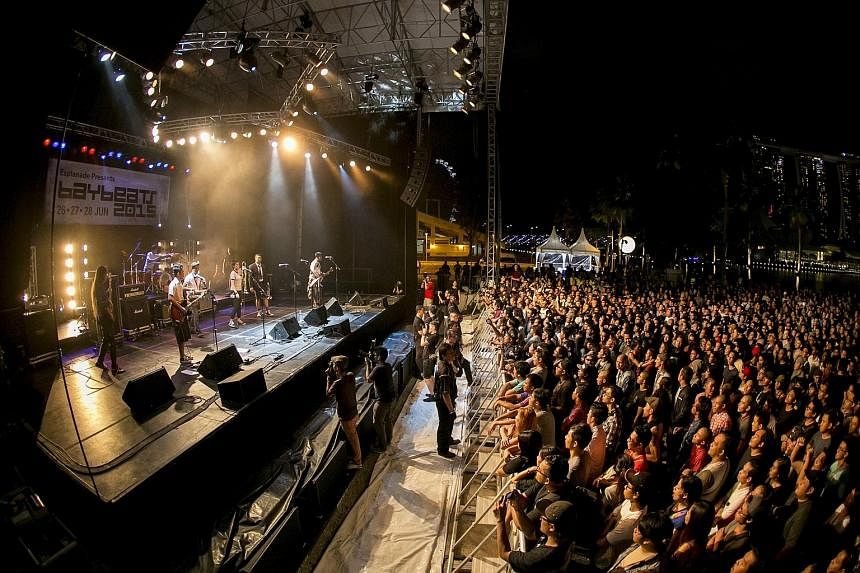Let's not be coy: Singapore's indie music scene is on the cusp of a new golden age.
The proof is in the quantity and quality of new recordings released this year.
In the past couple of months, and in the months to come, there are at least two EPs or albums of original, Singapore-made music a week, on average.
April to June alone saw 30 releases and, this month, acts such as The Observatory, singer- songwriter Deon Toh and The Steve McQueens will be putting out new works.
Fans are turning up in droves at gigs by home-grown indie talents, as shown by the thousands who flocked to the various stages at Baybeats over the weekend. Last month saw the first time home-grown indie acts - Charlie Lim, Inch Chua and The Great Spy Experiment - headline a concert, House Of Riot!, at the best music venue here, the Esplanade Concert Hall.
Among the releases, there have been two exceptional ones - Lim's Time/Space and Cheating Sons' eponymous second album, both of which have set a new standard with their exquisite songcraft and intricate production.
The rise in the quality and quantity in the indie music scene is not an anomaly, but the culmination of efforts by the artists themselves as well as a whole host of supporting players.
There are label/management entities such as House Of Riot and KittyWu, run by professionals from the advertising and media industries.
Back in the late 1980s and early 1990s, when the indie scene was just starting out, such professionally run management bodies were not the norm. It was common for the musicians to go the D-I-Y route, from booking shows and raising funds to recording in the studio and getting the music out to the public.
The next level was to get a recording deal with indie-friendly labels, such as the now-defunct Pony Canyon Singapore, which have deeper pockets and a wider music distribution and marketing network.
The music industry is a whole different animal these days, thanks mostly to how music is consumed, distributed and paid for online.
Today's new music collectives help the acts with the business side of things while leaving the artists free to do what they do best - create art.
Not to be outdone, major record labels are getting back into the act too. Sony Music Entertainment Asia Pacific recently signed on acts such as The Sam Willows; Universal Music signed its first Singapore artist, singer-songwriter Gentle Bones; and Warner Music Singapore has been helping singer Reuby score a regional presence since it signed him on last year.
Industry events and music festivals such as Music Matters and Laneway are also getting home-grown acts on their line-ups, giving the bands a shared platform with more established, international acts.
The support infrastructure is growing - the Musicians Guild of Singapore, set up in May, joins The Music Society Singapore (SGMUSO) in providing creative, administrative and logistical support to both professionals and amateurs.
In the past week, several indie acts including Lim, Gentle Bones and Pleasantry were in London for gigs that were part of SGMUSO Live Showcase, a series of overseas shows organised by SGMUSO and the Singapore Tourism Board (STB).
Local songwriters who are members of The Composers and Authors Society of Singapore (Compass) can also apply to the organisation for help in covering music-making or touring costs.
Official funding has not been lacking. The Government has been contributing in a big way through grants disbursed by the National Arts Council (NAC).
The House Of Riot! concert received $15,000. Acts such as ShiGGa Shay, Villes, Pleasantry, Lim, Take Two and Deon Toh each received $10,000 from NAC's Presentation and Participation Grant (Extended Play) scheme.
Aside from cash injections, young acts are nurtured and mentored under initiatives such as Baybeats' budding bands programme and NAC's Noise Singapore.
In the midst of all these positive developments, however, is the lamentable fact that many Singaporeans still cannot make a living from music alone.
The indie scene is still only a scene, not yet an industry.
Many indie musicians here are either studying or have day jobs. Gentle Bones, aka Joel Tan, for example, is going back to school to get a degree in business studies.
Some manage to become full-time musicians only temporarily - the members of Cheating Sons all put their careers on hiatus for a year before going back to their day jobs when the money ran out.
Lim is one of the rare ones making music a full-time career. More than just an immensely talented singer, songwriter and producer, the House Of Riot artist is connected and savvy enough to be able to score enough paying gigs to live off his music.
The ultimate aim should be to have most local indie musicians, and the support network of agents, show organisers and labels, be able to quit their day jobs and focus on music full time.
While no one can say for sure when that day will come, the scene is getting there. And it is only then that they can truly say that they have made it.
• This is the first of a fortnightly column.


